Vatican Set For First Ever Canonization Of Two Popes, With Two Popes Attending
On Sunday, it's the Day Of Four Popes.
Tomorrow morning in Rome, Pope Francis will preside over the canonization of Pope John XXIII and Pope John Paul II, an historic first in and of itself, while his predecessor, Pope Emeritus Benedict XVI, is in attendance:
VATICAN CITY — Pope John XXIII was the rotund Italian pontiff with a common touch, who told jokes, embraced the poor and became beloved as “the Good Pope.” To many liberal Catholics, he is still revered for the Second Vatican Council, the landmark event of the 1960s that sought to move the Roman Catholic Church into the modern age.
Pope John Paul II was the charismatic Polish pontiff who liked to sneak away from the Vatican to ski and who retooled the papacy in a new era of globalized media. His vision of a more rigid Catholicism made him a revered figure among many conservative Catholics suspicious of the liberalizing spirit introduced by John XXIII.
“The man who took the lid off and the man who tried to put it back on,” said Eamon Duffy, a professor of the history of Christianity at the University of Cambridge.
Now a new pope, Francis, is making his most public attempt to sew together the two men’s different legacies as he pushes his own vision of a church under a big tent. Francis will preside on Sunday over a first-of-its-kind joint canonization of the former popes, both iconic figures in the 20th-century church who will be elevated to sainthood during a Mass at St. Peter’s Square.
For Francis, who has spent the first year of his papacy straddling the divisions within the church, this twinning allows him to deftly avoid elevating one man over the other and serves his broader agenda of de-emphasizing ideological battles as he tries to renew excitement among the faithful and reverse a steady decline in church attendance.
“The Catholic Church is big enough to encompass the devotees of John XXIII and John Paul II,” said Kathleen Sprows Cummings, director of the Cushwa Center for the Study of American Catholicism at the University of Notre Dame. “That is the message he is sending.”
Unquestionably, the pairing has transformed the Mass into a global media event. Huge crowds are pouring into Rome, with estimates that hundreds of thousands of people — possibly more than two million — will fill St. Peter’s Square or watch the ceremony on more than a dozen large screens erected in piazzas across Rome. Portraits of both former popes have been draped on St. Peter’s Basilica, and souvenir shops are selling canonization trinkets.
“We love both popes,” said Antonio Rossi, 31, a teacher from Naples who walked with his girlfriend around the square on Friday. “They are two figures who left a great mark on the Catholic Church. What is important is that they both become saints because that is how I perceive them in my life.”
Vatican officials have played down the political subtext of the ceremony, arguing that reducing the two former popes to a left-right political shorthand is inaccurate and cheapens what for many Catholics is a joyous and deeply spiritual moment. The Rev. Thomas Rosica, who is working with the Vatican press office for the ceremony, disagreed with those who see the ceremony as a calculated gesture of reconciliation.
“Some would say that, but I wouldn’t go that far,” Father Rosica said. “We don’t use something like this to do that.”
Without question, though, the event has stirred considerable debate among many Catholics, about the process of canonizing saints and about the legacies of the two former popes
On some level, the way that the media is trying to turn the canonizations of John XXIII and John Paul II into some kind of an ideological thing is yet another example of how the American media doesn’t really do a good job of covering religion in general, and the Catholic Church in particular. While he may have been raised, and become a Priest and Bishop, in the pre-Vatican II Church, when Karol Wojtyła was Archbishop of Krakow he attended the Second Vatican Council and participated in its proceedings, as a Cardinal and then Pope he helped implement its teachings. Indeed, as Pope John Paul II he was instrumental in the expulsion of schismatic priests in France who asserted that John XXIII was somehow an illegitimate Pope because of Vatican II. So, the idea that there is some kind of conflict between the legacies of these two Popes, or that the Church is trying to strike some kind of “ideological balance” in this dual canonization is kind of silly.
That being said, it is true that many conservatives, or to use the more appropriate term, “traditionalists,” in the church saw the Papacy of John Paul II as, perhaps, an opportunity to push back on what they saw the the excessive liberalization of the Second Vatican Council. On the other hand, critics of John Paul II saw him as overly conservative when it came to issues such as contraceptives, abortion, the ordination of women as priests and other issues, Of course, it’s not as if his positions on these issues were any different from those of his predecessors John XXIII and Paul VI. Indeed, as John Paul noted in repeated Papal Encyclicals on these issues, the line of teaching in the Catholic Church on these issues was entirely consistent with previous teaching. Anyone expecting that things would change is either an outsider with no understanding of Catholic teaching, or an activist with their own agenda
In any event, the dual canonization is interesting in what it says about the future legacy of the current Pope. The ordinary procedure for Sainthood in the Catholic Church requires the confirmation of two miracles. However, shortly after he was elected to the Seat of St. Peter, Pope Francis decided to waive the requirement of a second miracle for John XXIII. Many saw that as a sign that Francis wished to finalize, once and for all, the legacy of Vatican II, and it’s hard to interpret it otherwise. What that means for the future of Francis’s Papacy is an open question. However, I’m sure it will be interesting to watch it unfold.
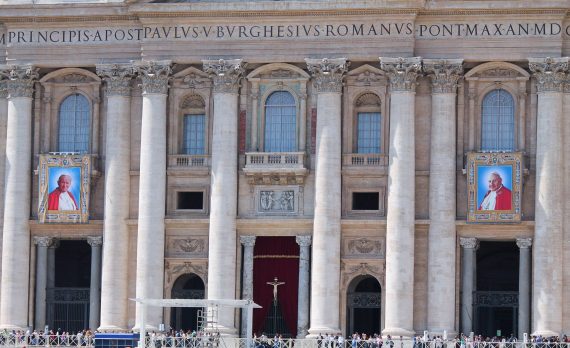

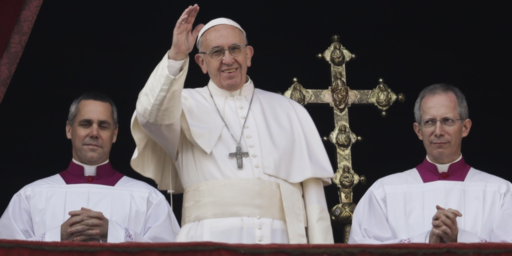
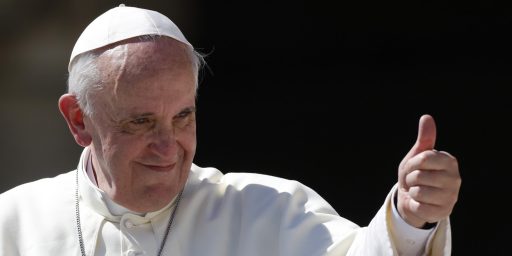
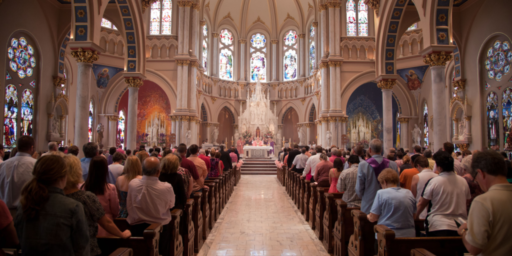

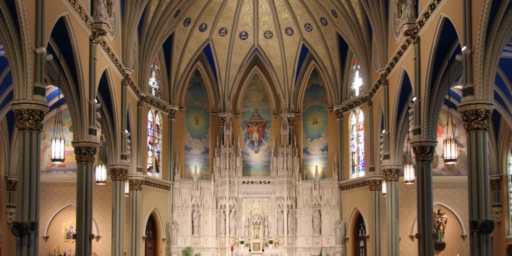
Am I the only one he sees these rituals absurd.
There are many things that human beings do that are absurd.
That doesn’t mean they aren’t important.
As a Protestant, it’s all only so much theater to me. They should just get rid of the “miracle-working” requirement for sainthood and canonize people as saints for their deeds in life.
Ritual is important in fostering a common identity and purpose among people. That’s a universal human reality and has been a shared part of the human experience since there’s been a human experience.
@Tillman,
yeah, it’s this sort of stuff that led to the split in the first place. And while a lot has gone on to help the two sides reconcile, this type of pageantry is still difficult for Protestants to get.
That said, the entire Pentecostal, which grew out of Protestantism, is also difficult for me to wrap my head around too.
Beyond that, everything that Doug and Dave Schuler wrote.
@Tillman: I’m an atheist and couldn’t agree more.
Great insights, Doug.
How many crucifixes will fall, crushing how many people? Not enough to wake people up to the utter farce this all is.
Zealots in velvet robes and pointy hats.
Francis is a breath of fresh air.
But in an outhouse so is a fart.
History shows that society progresses as it separates itself from religion.
It would be a miracle if we started to ignore these people.
@Matt Bernius:
Yeah, the whole “Biblical literalist” strain of Christian fundamentalism is, to use the best word, wacky. I don’t understand those people one bit.
And the snake-handlers, but at least they are pretty metal. Saw a video of a snake handler mass in a survey of religion class in college; I would be scared to death attending one of those.
@C. Clavin:
Sure. Whatever. The unbroken chain of progress leads us to one inevitable future of atheism, social tolerance, and full equality, where all men and women recognize and enjoy the fruits of science and reason.
@Tillman:
From an Anthro side, all of the different Christian Sects make sense. And they are all really fascinating.
From a Lutheran side, yeah, they’re tough for me to reconcile.
That said…
This actually makes sense once one really starts looking at Calvinism. Luther got it started in some respects, but Calvin took it up to 11. The challenge of balancing interpretation with the concept that one must have unwavering belief that they are saved in order to be saved (as opposed to liberating Lutheran doubt — seriously not arguing for the home team, just saying that Luther handled/accounted for doubt far better than Calvin IMHO) takes you a long way to accepting the concept of a literal interpretation of the Bible (however backwards it seems).
One of the best films on this (and one of the few watchable anthro films IMHO) is “Holy Ghost People” — possibly what you saw. It’s available from IMDB and definitely worth a watch.
https://archive.org/details/HolyGhostPeople
I’ve always thought it was telling that the only person bit in the entire video was the preacher.
BTW, I’d argue that Pentecostalism is one of the only true “American” form of Christianity. The Prosperity Gospel is the other.
@Tillman:
The irony of course is that Catholicism is the only major branch of mainstream Christianity to recognize the saving power of “good works” (versus the saving power of belief). And yet, they cannot let go of the entire miracle thing.
Such wonderful contradictions.
As a non-Catholic, canonizing somehow detracts from the person to me. It’s taking credit for their deeds away from them and giving it to God. That might be a good thing to the devout, and it kinda makes the “saint” a bit more modest, but the humanist in me thinks that the individual deserves the credit for their actions and decisions. Attributing it to God’s favor diminishes the element of individual choice and personal nature in their lives.
John Paul II was a tremendous force for good in the world. I have tremendous respect for him, and don’t like the notion that he was just another tool of God’s, and his own personality didn’t play as strong a role in his life.
Eh… maybe I’ve just met too many evangelicals who insisted that every single thing was God’s will, and the only proper way to celebrate anything was to praise God.
@Matt Bernius:
Yup, that’s it. My prof mentioned at the end how he knew someone involved in making the film, and he asked him once if the preacher survived the snake’s bite. He didn’t have a clue.
Glossolalia is one thing, but I could never get past how the service was something like
three hoursfour to six hours long.@Jenos Idanian #13:
Instead of coverage about Feinstein’s on-the-Senate-floor feud with the CIA over the torture report around a month ago, CBS instead aired some BS about a boat washed up in California from the tsunami that hit Japan and caused all the problems at Fukushima. It was a neat little puff piece about students at a high school taking the boat in, fixing it up, and eventually raising funds to take it back to Japan. Y’know, national news material.
Near the end of it, their teacher said something about how the boat ended up near their high school for a reason because everything happens for a reason. Which caused me to wonder why the hell anyone would think God (’cause the way she said it implied some faith in a deity) would cause a tsunami/nuclear disaster to eventually cause some kids in California to explore intercultural communication in Japan.
Now, if God created the universe, naturally everything is his fault. That’s pretty basic. Saying it to other people as an affirmation of some sort makes you a loon.
Saints and ritual aside, I’ve warmed up to the church quite a bit since Francis came on the scene.
@anjin-san: Saints and ritual aside, I’ve warmed up to the church quite a bit since Francis came on the scene.
Let me go out on a limb here and say that the next time Francis reaffirms some basic Catholic doctrine like “women can’t be priests” or “homosexual conduct is sinful” or “use of contraception is a sin,” those warm feelings will vanish and you’ll be howling about the pedophile priests scandal.
Interesting that John Paul II gets a pass for ignoring the immense child molestation scandal that happened and came to light during his papacy. Now THAT’S a miracle.
@ Jenos Idanian #13
Sorry dude, the rather limited novelty that your return to OTB provided has already run out.
@al-Ameda: Most of the pedophilia cases happened before and during JPII’s papacy; most of the accusations happened after. But – this addresses Jenos’s point too – a person isn’t canonized for being a perfect administrator, or for living a perfect life (although most led exemplary lives). They’re canonized in recognition of their being in heaven.
A saint is significant for three reasons: the work they did, the example they set, and the intercession that they perform. The last two are ongoing. That last one, intercession, is the reason why the Church investigates miracles. They’re God’s way of letting the Church know which of the departed are in heaven. As for God getting credit for the actions of a saint, any saint would testify that they deserve none of the credit for the things they did.
I realize that there’s a paradigm difference here. To a non-believer, I’m talking nonsense, and any “explanation” I give probably only makes things worse. I’m just trying to explain how Catholics look at this stuff.
And Jenos – I’m glad to see you back.
@Pinky:
As always, thanks for taking the time to reply. The Catholic approach to sainthood is also pretty unique within Christianity, so your effort to explain it are definitely welcome.
As to the issue of JPII’s papacy and reporting of sexual abuse, your comment that “most of the accusations happened after [JPII’s papacy]” is simply wrong. The deluge of reports occurred during the later years of his papacy. JPII died in 2005. The US sex scandals came to light beginning in the late 1990’s and early 2000’s. [source: http://en.wikipedia.org/wiki/Catholic_sex_abuse_cases%5D
JPII was involved in the attempts to deal with US reports. See for example this excerpt from his page on Wikipedia
However, Sex Scandals in other countries had plagued the Church since at least the late 80’s if not before. All of those occurred during the earlier (not to mention healthier JPII years).
While there can be a lot of debate as to how much lower officials at the Vatican protected the aging and deteriorating JPII from knowing the extent of the abuse, or the extent to which they insulated him from the various cover-up actions. But there is no *question* that the accusation flood gates opened and people like Cardinal Law were transferred to the Vatican under his watch.
@Matt Bernius: I was thinking about the more public timeline, when the extent of the problem became common knowledge. That definitely included the end of John Paul’s papacy, but I think it crested during Benedict’s. The acts themselves probably peaked in the 1970’s, although every sort of bad action has been around since the beginning.
@ Jenos
On second thought, I will respond to this:
The church absolutely deserves to be raked over the coals for the utterly disgraceful pedophile priest scandal, the fact that Benedict has done such a good job so far does not change that. I give them no passes based on my approval of the Pope’s message on poverty and wealth inequity. If the Pope parted the Red Sea tomorrow, it would not make the pedophile scandal right.
Time will tell how he deals with the scandal. If he does not meet the mark, I will be talking about it, regardless of where he stands on other issues.
I can see why you are having a hard time understanding my position, it can’t be explained in a cartoon balloon.
@Pinky:
Without a doubt it crested, and to some degree died down, during Benedict’s tenure. But that’s a different point than saying “most accusations came after JPII.”
Without a doubt, *handling* of sex abuse scandals and priests accused of sex abuse was something that JPII dealt with. One can wonder how much his handling of this — especially in the later years — was due to his medical issues (likewise, how much of the day-to-day handling was passed to the then Cardinal Ratzinger).
@Pinky:
One other point worth bringing up (that I didn’t realize until i began to research my response), was that prior to 2001 these allegations were typically investigated at the diocese level and it was Cardinal Ratzinger who worked to have the Vatican take over control of all investigations.
Here’s an excerpt on this transition from Wikipedia:
I think this is, frankly, an underreported fact about Pope Benedict.
Correction – Francis has done such a good job
@Matt Bernius: As Doug notes, the press does a terrible job covering religion. Benedict wasn’t photogenic, and he had a German accent just like all the Nazis and Soviets in action movies, so they wrote the part around him. Even the Allen quote indicates that he went from being a black (or gray) hat to being a white hat in one moment: that’s the kind of black-and-white narrative that is rarely true.
Of course, you can only tell yourself that “the press is right about everything except the subjects I know about” for so long, before you start to wonder if they’re right about anything.